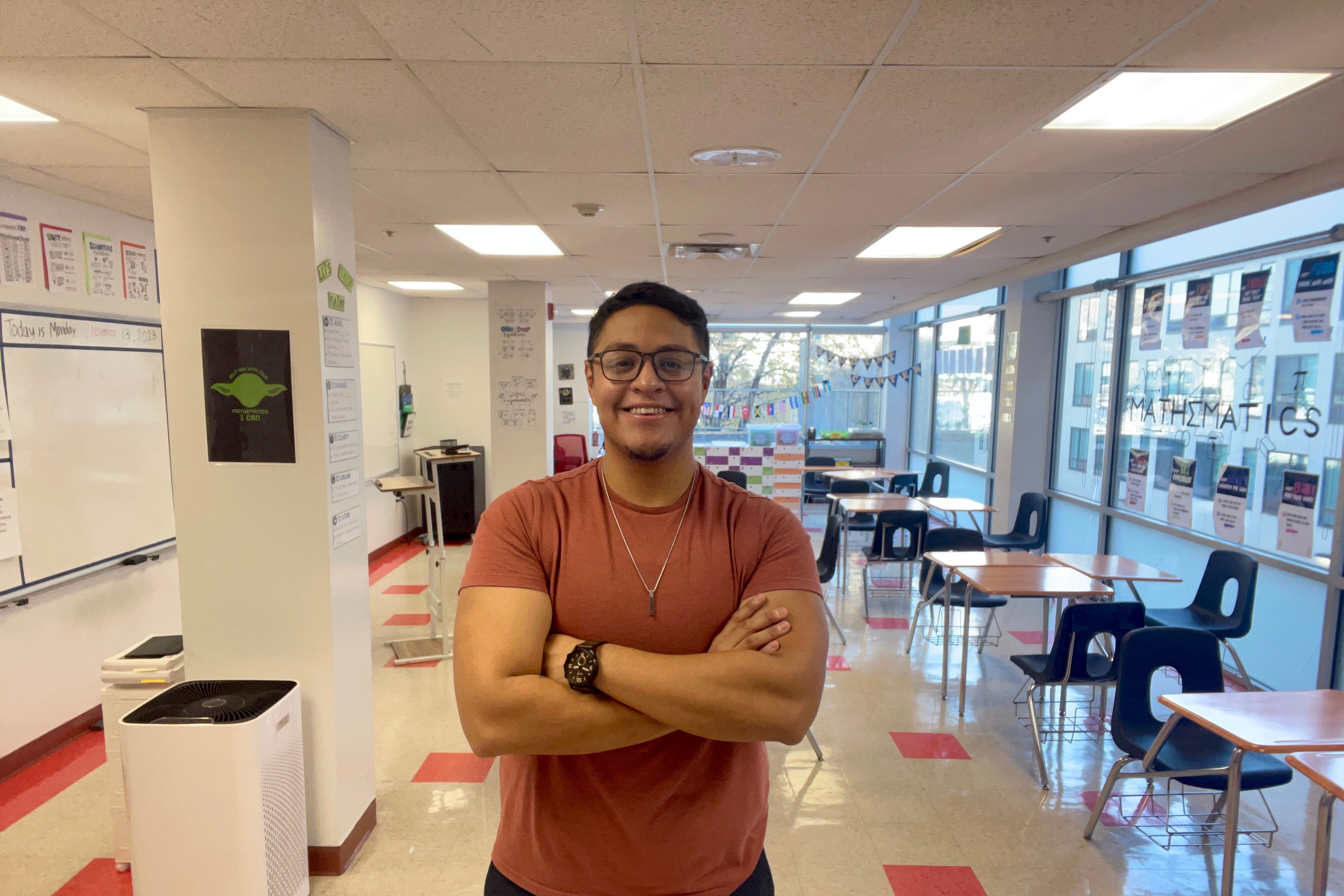Sign up for Chalkbeat Newark’s free newsletter to keep up with the city’s public school system.
When Salvador Quijada, a seventh and eighth grade math teacher at Philip’s Academy Charter School, thinks back on his own journey as a mathematician, he gives credit to one high school math teacher who pushed him to take on AP calculus. Quijada said his teacher’s belief that he could succeed allowed him to challenge himself in ways he might not have otherwise considered.
Now, Quijada channels that positivity into his lessons. Last year, he approached Philip’s principal, Yasmeen Sampson, and asked to pilot a new, accelerated program to help prepare more students for Algebra 1.
State test math scores remain a cause for concern, as Newark’s overall passing rate sits at 15% for students in grades 3 to 9. Both traditional public and charter schools in the city have prioritized increasing math proficiency during the 2023-24 school year.
Quijada believes that giving students the opportunity to work on more difficult equations fosters excitement for the subject. He said that this year, his accelerated students have appreciated the opportunity to tackle challenges and have flourished in Quijada’s classroom.
In a recent interview with Chalkbeat Newark, Quijada, who is in his seventh year teaching at the preK-8 school, spoke about his passion for math and his desire to pass it down to Philip’s Academy Charter’s young mathematicians.
This interview has been lightly edited for length and clarity.
How and when did you decide to become a teacher?
I was a student at the New Jersey Institute of Technology and came to Philip’s Academy as a part of a work-study program to tutor. I enjoyed seeing the scholars grow an appreciation for mathematics and thought of my favorite math teacher who inspired me to pursue a career in mathematics. Due to all of these factors and a lot of thinking, I decided to change my career path to become a middle school mathematics teacher. It has been the best decision. I enjoy coming to work and helping my scholars in any way I can!
What’s your favorite lesson to teach and why?
My favorite lesson is how to solve and write algebraic equations because algebra is the foundation to all mathematics. The scholars always enjoy it because they get happy from solving a tough equation and finding the value of an unknown variable!
What’s the best advice you’ve ever received, and how have you put it into practice?
The best advice I’ve ever received has been to get the kids to talk in class. It seems like such a counterproductive situation, but it promotes engagement and higher learning when the kids talk to each other. They learn the most from each other! The kids are able to talk through a problem and provide reasoning for their thinking, and this allows for mistakes to be understood a lot better. We do a lot of group collaboration, especially when using our vertical learning surfaces — working on problems on our windows or whiteboards, which has the kids up and moving.
What new issues arose in your classroom during the most recent school year, and how did you address them?
There were a lot of students that needed an additional push in terms of their mathematics. Another teacher and I saw many students who excelled in mathematics, so we wanted to bring an accelerated version of the seventh grade curriculum. We wanted to provide a challenge and help them succeed further and avoid plateauing. We brought up the idea to Principal Sampson, and she encouraged us to move forward with it! I did the research to find the right curriculum. The kids are definitely enjoying the work and the challenge that the class brings. They are collaborating, discussing, and working hard.
What’s something happening in the community that affects what goes on inside your classroom?
Newark always has so much going on! As a Newark resident, I see new restaurants, shows, and opportunities for culture and arts. We have taken students to the museum, the New Jersey Performing Arts Center, and to Prudential Center events. I typically teach STEM classes for electives, but we have been working to expose students to more holistic experiences, so I requested to teach drumming. In this class, we look at a variety of drumming styles from all around the world and learn different beats to immerse ourselves in different musical genres.
How do you approach news events in your classroom?
I like to be transparent with the kids and talk through things. Our Leader in Me classes promote time dedicated to discussions and social-emotional learning, which are extremely important. The scholars always share their feelings and great perspectives as young citizens of the world.
Tell us about something you’ve done as a teacher that you’re especially proud of.
I am especially proud of creating a classroom environment that encourages respect, learning, and engagement from everyone who enters. I always want my scholars to feel comfortable and safe, even when making mistakes. I try to emulate my favorite teachers throughout my life. In my first year as a teacher, I had a student who always challenged me and made it difficult to teach. I had to really learn how to work with him and get to know him to best support him. Once I was able to build a relationship with him, it became much easier to teach him. Now, seven years later, I still keep in touch with him and enjoy hearing all of his accomplishments.
Samantha Lauten is a fall reporting intern for Chalkbeat Newark covering public education in the city. Get in touch with Samantha at slauten@chalkbeat.org or reach the bureau newsroom at newark.tips@chalkbeat.org.







